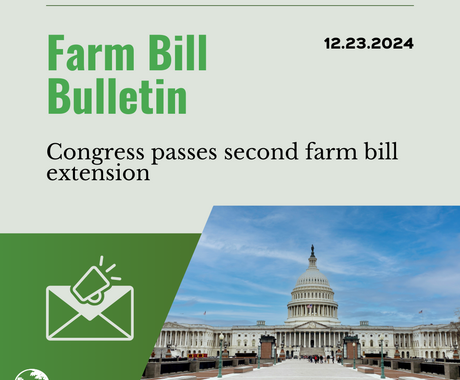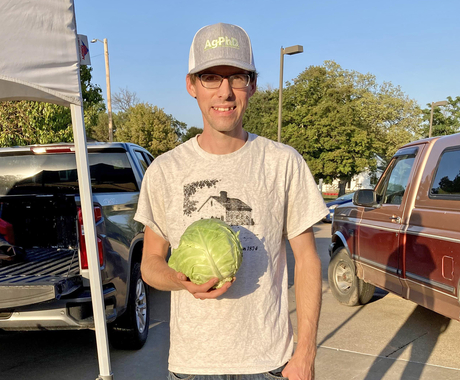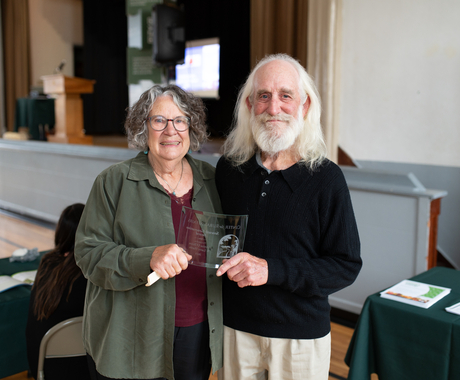As a teenager, Corinne Kolm wanted to live in a big city and have nothing to do with her family’s farming legacy. With time, her strong agricultural roots took her back to the land, and she’s glad it did.
Originally from northeast Nebraska, Corinne is a fifth-generation farmer, a heritage of which she is very proud. Her grandfather and his siblings all farmed, as well as several of their children.
“When you get to my generation, my brother and I are the only ones still working the land and both of us have off-farm income as well,” she said. “It is very difficult to make a living on a small farm these days, and I think the consolidation of farms into entities that own thousands of acres is a huge loss to our culture, health, and the environment.”
Corinne grew up around crop ground, cattle, pigs, and chickens. She studied agroecology in graduate school and has worked in local foods and organic certification for nearly 20 years.
“My parents were always great lovers of the outdoors, but much of their concern about the food system came after I became ill at the age of 8 and was diagnosed with an endocrine disorder,” Corinne said. “My mom eventually went to graduate school and did research on pesticide runoff, and my dad started questioning the use of chemicals in farming.”
In 2018, Corinne and her husband purchased their 80-acre operation, Giving Tree Farm near Beatrice, from retiring farmers who wanted to keep the land in diversified sustainable production.
“Our farm is so beautiful and very diverse,” said Corinne. “We have a small market garden, orchard, pastures, restored prairie, grass-fed cattle, and laying hens. We also have several hedgerows, windbreaks, ponds, creeks, and solar and wind power.”
Corinne’s passion for local, organic foods and the desire to live in the country played a big part in her decision to begin farming.
“My husband and I had concerns about our health, including the quality of the food we were eating and the amount of time that we spent indoors sitting in front of a computer,” she said. “For us, farming is a much healthier lifestyle.”
Interest in sustainable farming led her to explore other methods, including implementing conservation practices. This search led her to the Center for Rural Affairs’ Beginning Farmer Conservation Fellowship Program.
The program began in 2022 with eight individuals, plus mentors. The most recent cohort began in spring 2024 with eight beginning farmers, including Corinne.
Not only was Corinne intrigued by the program’s mentorship opportunities and project funding, she also felt motivated to apply because friends and previous fellows Katie Jantzen, Sara Brubacher, and Elle Worley all gave her the encouragement she needed to give it a try.
“Katie was an intern at my farm for the previous owners and now has her own farm 30 minutes from me and is one of my closest friends,” said Corinne. “We met Sara and Elle at a conference a few years ago and formed an informal female farmer group that tries to get together a couple of times a year. They really understand the trials and triumphs of farming, and we provide great support for one another.”
As part of the program, conservation fellows design and implement a project on their own farms or land they are farming. They present their findings at a farm tour to their mentors, project partners, and other beginning farmers.
For her project, Corinne is working to improve soil health primarily through reducing tillage.
“Our ground has been intensively tilled for a really long time, and the soil really needs improvement,” she said. “The project is going well so far. I’m setting up the framework now and will continue the process in the future.”
Eventually, Corinne plans to develop her farm into a place where people can visit and learn about the food system, pick their own produce, and connect with nature.
Being a conservation fellow and working with other beginning farmers and her mentor has helped her get closer to bringing that plan to fruition.
“For me, one of the biggest benefits has been from my mentor; he is such a wealth of knowledge and encouragement,” said Corinne. “Learning from other farmers means different voices bringing different perspectives and sharing ideas that make us all better. It’s a great honor to have been named a fellow, and I would absolutely recommend this experience to other beginning farmers.”
Applications to be a 2025 fellow will be accepted soon. For updates, visit cfra.org/beginning-farmer-conservation-fellowship-program.
The Beginning Farmer Conservation Fellowship is a program of the USDA-NRCS under agreement number NR243A750003C010 Conservation Outreach: Equity Conservation Cooperative Agreements.





